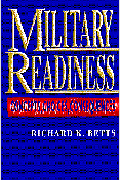Throughout most of American history, U.S. military forces proved unready for the wars that were thrust upon them and suffered costly reverses in early battles. During the Cold War, for the first time, U.S. defense policy tried to maintain high readiness in peacetime. But now, with the Cold War over and defense budgets falling, what will happen to U.S. military forces? Will they revert to a state of unpreparedness or find a new balance?
Politicians and military planners alike have found this crucial issue especially difficult to deal with because they have often misunderstood what readiness really means. In this book, security expert Richard Betts surveys problems in developing and measuring combat readiness before, during, and after the Cold War. He analyzes why attempts to maximize it often have counterproductive effects, and how confusions in technical concepts cause political controversy.
The book explores conflicts between two objectives that are both vital but work against each other because they compete for resources: operational readiness to fight immediately, and structural readiness—the number of organized units that increase military power, but require time during a crisis to gear up for combat. Betts also discusses the problem brought on by the Cold War and plunging defense budgets: mobilization readiness—the plans and arrangements needed to shorten the time for recreating a large military if it once again becomes necessary. Betts offers new ideas for understanding the dilemmas and tradeoffs that underlie debates on how readiness should be maintained in peacetime, and he explores the strategic consequences of different choices.
Authors
Richard K. Betts is a professor of political science at Columbia University. He was a Senior Fellow and Research Associate at the Brookings Institution and has taught at Harvard and the Johns Hopkins University's Nitze School of Advanced Interna
